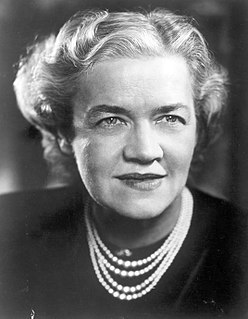A Quote by Margaret Chase Smith
The right to criticize: the right to hold unpopular beliefs; the right to protest; the right of independent thought. The exercise of these rights should not cost one single American citizen his reputation or his right to a livelihood... Otherwise none of us could call our souls our own.
Related Quotes
There is a kind of dictatorship that can come about through a creeping paralysis of thought, readiness to accept paternalistic measures by government, and along with those measures comes a surrender of our own responsibilities and therefore a surrender of our own thought over our own lives and our own right to exercise the vote. The free system gives the right to every citizen to do something for himself. Because he has the right, the opportunity is always there.
Reader's Bill of Rights 1. The right to not read 2. The right to skip pages 3. The right to not finish 4. The right to reread 5. The right to read anything 6. The right to escapism 7. The right to read anywhere 8. The right to browse 9. The right to read out loud 10. The right to not defend your tastes
Even a superstitious man has certain inalienable rights: the right to harbor and indulge his imbecilities, provided only that he does not try to inflict them upon others by force; he has the right to argue for them as eloquently as he can. But he has no right to be protected from the criticism of those who do not hold them. He has no right to demand that they be treated as sacred. He has no right to preach them without challenge.
You may be surprised to learn that, in our law, although the fetus is currently without the right to life, it does have some rights. For instance, under civil law, the unborn child has the right to inherit part of his father's estate should his father die before he is born, and he has the right to sue his Mother, or a doctor, for injuiries sustained while in the womb.
The fundamental rights of [humanity] are, first: the right of habitation; second, the right to move freely; third, the right to the soil and subsoil, and to the use of it; fourth, the right of freedom of labor and of exchange; fifth, the right to justice; sixth, the right to live within a natural national organization; and seventh, the right to education.
Rights mean you have a right to your life. You have a right to your liberty, and you should have a right to keep the fruits of your labor....I, in a way, don’t like to use those terms: gay rights, women’s rights, minority rights, religious rights. There’s only one type of right. It’s the right to your liberty.
So too, monks, I saw the ancient path, the ancient road traveled by the Perfectly Enlightened Ones of the past. And what is that ancient path, that ancient road? It is just this Noble Eightfold Path; that is, right view, right intention, right speech, right action, right livelihood, right effort, right mindfulness, right concentration.
It is not the right of property which is protected, but the right to property. Property, per se, has no rights; but the individual - the man - has three great rights, equally sacred from arbitrary interference: the right to his life, the right to his liberty, the right to his property The three rights are so bound together as to be essentially one right. To give a man his life but to deny him his liberty, is to take from him all that makes his life worth living. To give him his liberty but take from him the property which is the fruit and badge of his liberty is to still leave him a slave.































